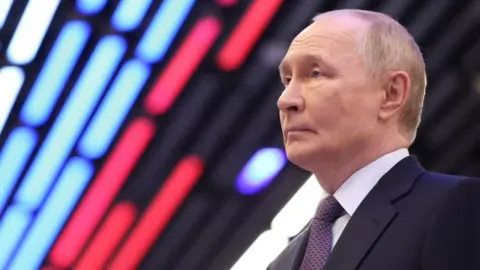Sometimes it's not what's said that makes the biggest impression.
It's the reaction.
In the Russian Far East, Vladimir Putin delivered a warning to the West: don't even think about sending soldiers - and that includes peacekeepers - to Ukraine.
If some troops appear there, the Russian president said, especially now while the fighting's going on, we proceed from the premise that these will be legitimate targets for destruction.
The audience at the economic forum in Vladivostok burst into applause, with Russian officials and business leaders apparently welcoming the threat to destroy Western troops. Observing the scene in the hall, I found the applause quite chilling.
This came just a day after Kyiv's allies, the so-called Coalition of the Willing, pledged a post-war reassurance force for Ukraine.
The audience applauded again when the Kremlin leader suggested that he would be prepared to meet Ukraine's President Volodymyr Zelensky - but only on home soil. The best place for this is the Russian capital, in Hero City Moscow, said Putin.
Outside Russia, Putin's proposal has been dismissed as unserious, a complete non-starter. A case of political trolling.
In many ways it encapsulates the Kremlin's current position on the war in Ukraine: Yes, we want peace, but only on our terms. You reject our terms? No peace then. This uncompromising stance is fueled by a belief that Russian forces have the initiative on the battlefield, diplomatic achievements, and a perceived failure of the West to isolate Russia.
Putin's recent comments about light at the end of the tunnel imply a vision of victory in Ukraine, with significant implications for global order. As prospects for peace seem misaligned between Russia and Ukraine, different paths are being forged, each with distinct end goals.




















